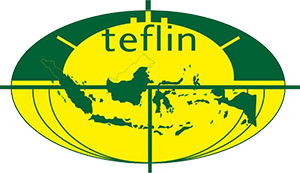Fun Writing Using WebQuest
Abstract
Full Text:
PDFReferences
Abdullah, M. H. 1998. Problem-Based Learning in Language Instruction: a Constructivist Method. Retrieved November 14, 2010, from Indiana University, ERIC Clearing House on Reading, English, and Communication Digest Web site: http://www.indiana.edu/~eric_rec/ieo/digests/d132.html
Brown, H. D. 2001. Teaching by Principle: An Interactive Approach to Language Pedagogy. New York: Longman.
Brown, H. D. 2004. Language Assessment: Principles and Language Classroom Practices. White Plains, NY: Pearson Education.
Burns, A. & Joyce, H. 1999. Focus on Speaking. National Centre for English
Chuo, T.W.I. 2007. The Effects of the WebQuest Writing Instruction Program on EFL Learners' Writing Performance, Writing Apprehension, and Perception. The Internet TESL Journal, 11 (3). Retrieved November 18, 2010, from http://itselj.org/Articles/Chuo-WQWI.html
Cohen, A. D. 1994. Assessing Language Ability in the classroom. 2nd ed. Boston: Heinle & Heinle Publishers.
David and Roger Johnson. Cooperative Learning. [Online] Retrieved June 26, 2011 from. http://www.clcrc.com/pages/cl.html.
Depdiknas. 2006. Kurikulum Tingkat Satuan Pendidikan (School Based Curriculum). Jakarta: Depdiknas.
Dodge, B. 1997. Some thoughts about WebQuests. Retrieved November, 17, 2010, from http://edweb.sdsu.edu/courses/edtec596/about_webquests.html
Dodge, B. 2002. WebQuest taxonomy: A Taxonomy of Task. Retrieved October 29, 2010, from http://webquest.sdsu.edu/taskonomy.html.
Dodge, B. 2007. What is a WebQuest?. Retrieved September 26, 2010, from http://webquest.org/.
Dudeney, G. 2003. The Quest for Practical Web Usage. TESL-EJ, 6(4). Retrieved November 14, 2010, from http://tesl-ej.org/ej24/int.html
Ge Stoks 2002. WebQuest: Task-based learning in a digital environment. Babylonia, 3. Retrieved November 17, 2010, from http://www.babylonia-ti.ch/BABY102/geen.htm
Gebhard, J. 2000. Teaching English as a Foreign or Second Language: A Teacher Self-development and Methodology Guide. Michigan: The University of Michigan Press.
Harmer, J. 2004. How to Teach English. New York: Longman.
Hill, C, Ruptic, C & Norwick, L. 1998. Classroom Based Assessment. Norwood: Christopher-Gordon Publisher.
Hyland, K. 2003. Second Language Writing. Cambridge: Cambridge University Press.
Koshy, V. 2005. Action Research for Improving Practice: A Practical Guide. London: Paul Chapman Publishing.
Language Teaching and Research (NCELTR). Sydney: Macquarie.
Lai, Ming and Law, Nancy (2006). Peer scaffolding of knowledge building through collaborative groups with differential learning experiences. J. Educational Computing Research, 35, 123-144. Retrieved June 27, 2011 from http://instructional_scaffolding.htm.
Nunan, D.1991. Language Teaching Methodology: A Textbook for Teachers. New York: Prentice Hall.
Oshima, A. & Hogue, A. 1981. Writing Academic English. Tokyo: Addison Wesley Publishing Company.
Richards, J. C. & Renandya, W. A .(Eds.). 2002 Methodology in Language Teaching: An Anthology of Current Practice. Cambridge: Cambridge University Press.
Spratt, P. A. & William, M. 2005. The Teaching Knowledge Test Course. Cambridge: Cambridge University Press.
Teaching: An Anthology of Current Practice. Cambridge: Cambridge University Press.
Widiati, U. & Cahyono, B.Y. 2006. The Teaching of EFL Writing in the Indonesian Context: The State of The Art. Jurnal Ilmu Pendidikan. 13(3), 139-150.
Yelland, Nicola, and Masters, Jennifer (2007). Rethinking scaffolding in the information age. Computers and Education, 48, 362-382. Retrieved June 27, 2011 from http://scaffolding_and_educational_based_learning_in_educational_setting.htm.
DOI: http://dx.doi.org/10.21043/jetli.v1i2.3745
Refbacks
- There are currently no refbacks.
Copyright (c) 2019 Journal of English Teaching and Learning Issues







